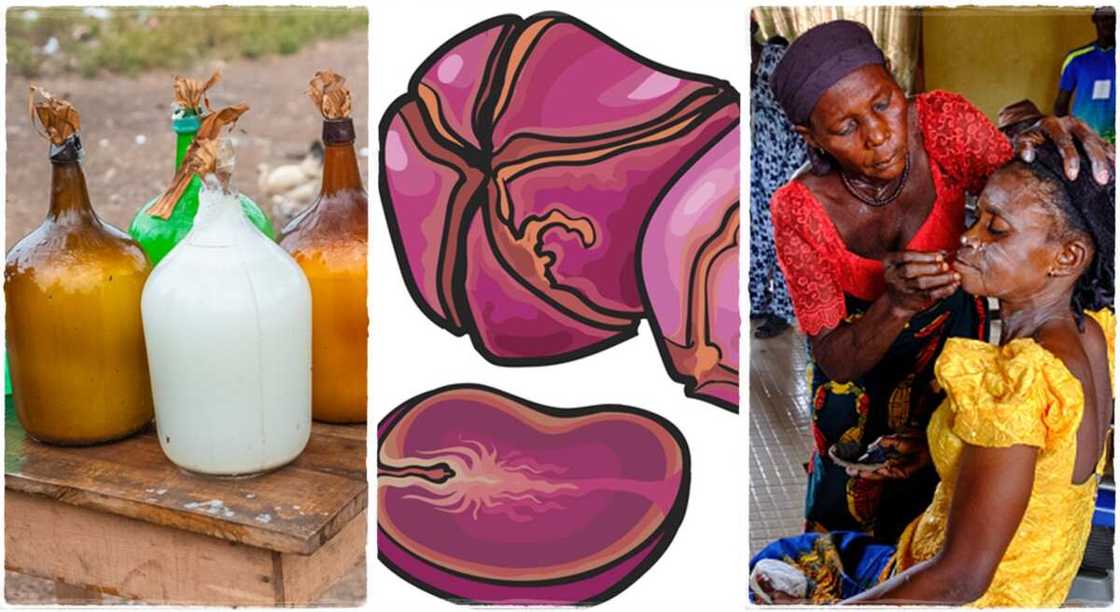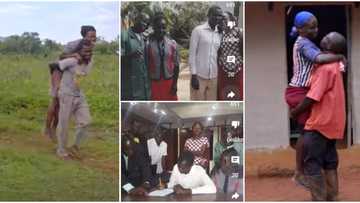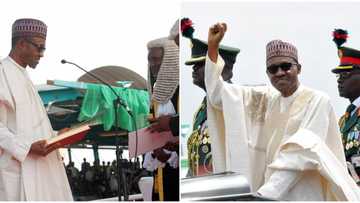Igba Nkwu: The Beautiful Igbo Culture of Traditional Marriage and How it is Done
The Igbo of Eastern Nigeria, undoubtedly, has several beautiful ceremonies deeply rooted in their culture. Whether it is the new yam festival or family gatherings like naming ceremonies, the Igbo take pride in their cultural events and celebrate them in the most elaborate ways possible.
PAY ATTENTION: Сheck out news that is picked exactly for YOU ➡️ click on “Recommended for you” and enjoy!
Such cultural events are marked with great pomp and pageantry, and the elders make sure the younger ones take note so they can transfer the same to their own children for generational preservation.

Source: Getty Images
One of the most cherished cultural ceremonies in Igbo land is the Igba Nkwau or traditional marriage. Before the coming of the White man and the introduction of Western culture, marriages in Igbo land were conducted exclusively in the traditional way. With the introduction of churches and courts, many couples now have different wedding ceremonies after performing the requisite traditional marriage rites that tie them together.

Read also
"They found themselves falling in love": 2 men exchange their wives and kids in video, remarry in style
However, the coming of the White man and the introduction of church and court marriages did not erase the Igbo traditional marriage ceremony called Igba Nkwu. In fact, it has further been strengthened because, without traditional marriage, couples are regarded as not correctly married even if they do church and court weddings.
How Igba Nkwu is done in Igbo land
By definition, the Igba Nkwu is the traditional Igbo way of celebrating marriage or getting married or giving women out in marriage. It is an important cultural event which is part of the marriage process. People take pride in it and go all out in terms of financial expenditure if they can. Others do theirs moderately if they cannot afford elaborate spending. But in all, there are basic things that are done before the Igba Nkwu ceremony, whether it is elaborate or low-key.
PAY ATTENTION: Share your outstanding story with our editors! Please reach us through info@corp.legit.ng!

Read also
Real Warri Pikin, Iyabo Ojo, DJ Cuppy, other celebrity weddings fans look forward to in 2023
The marriage proposal and engagement
In the beginning, when the man is convinced that he has found a suitable wife material, he is expected to propose marriage to her. This could happen between the two of them. Things have changed. Elders have it that in the past, marriage proposals used to be between the two parents and not the couple. But now, it happens between a couple who may have been in a relationship before deciding to marry.
If the lady accepts his proposal, both families are informed, and the process of traditional marriage is formally kicked off.
The day of the introduction of both families
While there is no fixed number of days, the process of a traditional wedding could take as long as four days. Sometimes, it is spread across many months. It all depends on how the couple wants it. On the first day, the groom, accompanied by his parents and extended family, carries palm wine to the bride's family. This is called introduction or 'iku aka na uzor'.

Read also
“I belong to everybody and I belong to nobody”: Throwback to Buhari’s 2015 inauguration speech
The groom's father or whoever is speaking on his behalf explains to the bride's family the purpose of their visit. The bride's father or whoever represents him is expected to welcome the groom and his family. He then calls his daughter and jovially tells her the mission of the groom. If she agrees in the presence of both families that she and the groom are in agreement to tie the knot, then the process is allowed to go on.
The collection of bride price list
On the second day, the groom takes palm wine to the bride's family. His family and even more people could follow him this time around. While there are slight variations in many parts of Igbo land, the purpose of this second visit is to know what it would take to marry the bride. Before the visit, the bride's family or 'umu nna' prepares a long list of requirements. This list contains the bride price or dowry and every other thing that would be needed. The groom and his family take the list home to study it.

Read also
Finance, healthcare for veterans: 5 Things entertainment industry stands to benefit from Tinubu's presidency
Negotiations and payment of bride price
On the third day, the groom's family revisit the bride's family, this time around prepared to pay the bride price captured in the list earlier collected and studied. Usually, it is not everything listed in the bride pride list that is paid, as some concessions are usually made. There are usually a lot of negotiations between the two families. It is after the payment of the bride price that the groom is deemed to have properly married his wife, according to Igbo culture.
The day of Igba Nkwu
The Igba Nkwu is the icing on the cake. It is the actual celebration of the marital union after the bride price has been paid and all marital rites observed. These days, some couples do the Igba Nkwu and the payment of the bride price on the same day. But some fix theirs on different days.

Read also
Rainy wedding day becomes a beautiful memory for couple, supportive friends stand solidly behind them
The day of Igba Nkwu is filled with many side attractions. The bride and groom may appear in uniform dresses, but many prefer to wear the Igbo traditional attire called 'Isiagu.'
It starts with the bride's father, who pours her a cup of palm wine which she holds with dignity and dances around the arena in search of her husband.
While she dances and searches, many young men will come her way to ask for the wine, and she declines. She is expected to rebuff all distractions and focus on finding her husband among the guests, well-wishers and family members.
Once she sees her husband, she hands him the cup of palm wine while kneeling. This signifies to the crowd that the two are now married traditionally. The groom stands and follows her to the arena. The bride's father then takes her hand and formally hands her over to her husband in public glare.
Conclusion on Igba Nkwu
Things are changing, and many couples try to cut costs during their traditional marriage. Some grooms now silently go to the bride's family, pay the bride price and take the wife home without an elaborate ceremony. It could be between just the two families where the bride's father gives wine to his daughter to give to the groom to mark the Igba Nkwu in a low-key way once the bride price is paid. But the basic value of getting married properly through the laid down tradition of payment of bride price and consent of both families still remains intact.
The story of Benue yam
In a related story, Legit.ng reported that Benue state is known for its large production of yams.
Culturally, yam farming is a cherished thing among the Tivs of Benue state.
Zaki-Biam is the headquarters of yam in the state, as it has the largest yam market in Nigeria.
Source: Legit.ng



